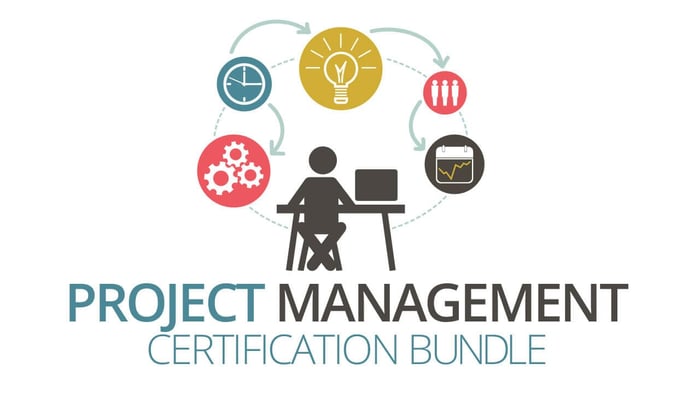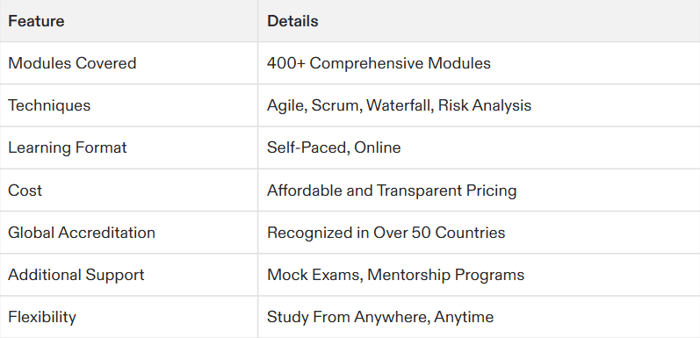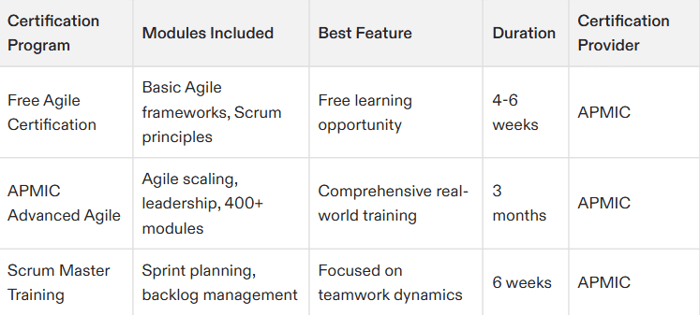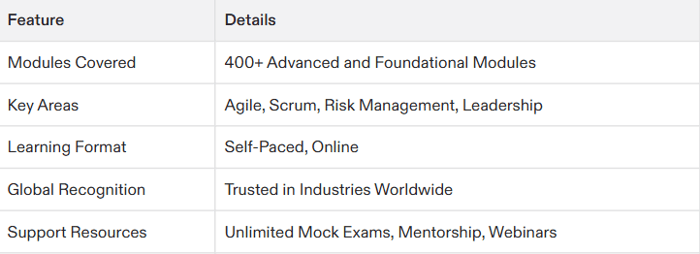Table of Contents
- What Are the Top Project Management Certifications?
- Other Types of Project Management Certifications
- Why Pursue a Top Project Management Certification?
- Comparing Top Project Management Certifications
- How to Choose the Right Certification
- Less Commonly Known Facts About Project Management Certifications
- Conclusion
- FAQs
Imagine you're at a party, and someone asks, "What do you do?" You proudly say, "I'm a project manager!" But then they ask, "Oh, are you certified?" Suddenly, your confidence wavers. Don't let that happen! In today's fast-paced world, having the right project management certification can be the difference between leading a team to victory or struggling to get noticed. Let's dive into the top project management certifications that will make you the MVP of your industry.
What Are the Top Project Management Certifications?
Project management certifications are not just pieces of paper; they are badges of honor that prove your expertise in managing projects from start to finish. These certifications are globally recognized and cater to a wide range of professionals, from entry-level managers to seasoned leaders.
Here are some of the most prominent certifications:
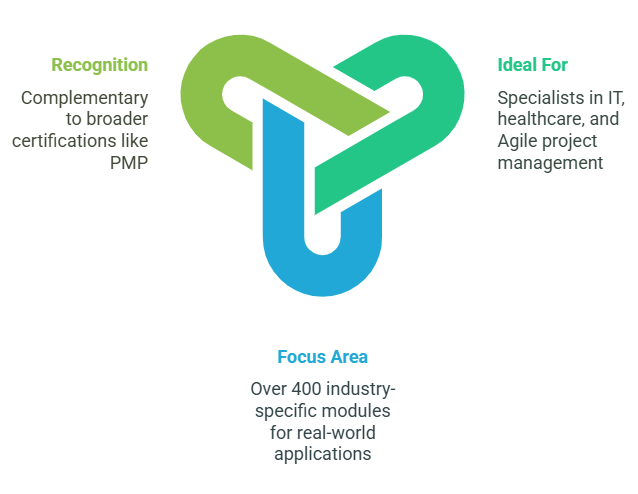
PMP (Project Management Professional)
The PMP certification is a beacon of excellence in the project management world, ideal for experienced professionals seeking to solidify their expertise across diverse industries. Here’s a deeper dive into what makes PMP so valuable:
Ideal For: The PMP is perfect for seasoned project managers who have overseen multiple projects and are looking to enhance their credibility. It’s particularly beneficial for those managing complex projects that involve a broad range of methodologies, from traditional predictive approaches to modern Agile and hybrid models.
Focus Area: PMP focuses on broad project management methodologies, encompassing Agile, predictive, and hybrid approaches. This versatility allows certified professionals to adapt to various project environments, making them highly sought after in industries like IT, construction, finance, and healthcare. The PMP framework is built around the Project Management Body of Knowledge (PMBOK Guide), which provides a comprehensive guide to project management best practices.
Recognition: The PMP certification is highly respected worldwide and is often considered the "gold standard" in project management. It is recognized across all industries and regions, making it a valuable credential for professionals looking to work globally. The PMP is administered by the Project Management Institute (PMI), a leading professional organization in the field of project management.
PRINCE2 (Projects IN Controlled Environments)
PRINCE2 is a structured project management methodology that excels in controlled environments, particularly in Europe and government sectors. Here’s a closer look at its strengths:
Ideal For: PRINCE2 is ideal for professionals working in structured environments, such as government agencies or large corporations, where processes and governance are paramount. It’s particularly beneficial for those who prefer a methodical approach to project management, with clear roles and responsibilities defined throughout the project lifecycle.
Focus Area: PRINCE2 focuses on controlling project stages, risks, and outcomes using a structured approach. It emphasizes dividing projects into manageable stages, ensuring effective control and oversight. The methodology is built around seven principles, seven themes, and seven processes, which collectively guide project managers through the project lifecycle. This structured framework ensures that projects are aligned with business objectives and stakeholder needs.
Recognition: PRINCE2 is widely valued in Europe and government sectors, where its structured approach is highly appreciated. It is also recognized globally, although its adoption varies by region. PRINCE2 Agile, a variant of the methodology, combines the structured approach of PRINCE2 with the flexibility of Agile practices, making it suitable for environments where adaptability is crucial.
APMIC Certification
The APMIC Certification is designed for specialists in niche industries, offering a unique blend of industry-specific knowledge and project management skills. Here’s what sets it apart:
Ideal For: The APMIC Certification is ideal for specialists in areas like IT, healthcare, and Agile project management. It’s particularly beneficial for those who need to manage projects with specific industry requirements or regulations. For instance, in healthcare, APMIC can provide insights into managing compliance and innovation projects.
Focus Area: APMIC offers over 400 industry-specific modules covering real-world applications and tailored insights. This depth of training equips professionals with the specialized knowledge needed to tackle complex challenges in their respective industries. Whether it’s streamlining Agile methodologies in IT or managing healthcare initiatives, APMIC provides the necessary expertise to excel in niche fields.
Recognition: APMIC is known for its depth and flexibility, making it an excellent complement to broader certifications like PMP. While PMP provides a broad foundation in project management, APMIC offers specialized training that can enhance your career prospects in specific industries. This combination of broad and specialized knowledge can significantly boost your marketability and career advancement opportunities.
If you're looking for an entry-level project management certification, check out this best entry-level project management certification guide.
For professionals considering Microsoft project management certification, this resource on Microsoft project management certification provides detailed insights into the available programs.
Additionally, if you're curious about the career opportunities available with project management certification, explore this guide on jobs with project management certification.
Other Types of Project Management Certifications
Beyond PMP, PRINCE2, and APMIC, there are several other certifications that cater to different needs and career stages:
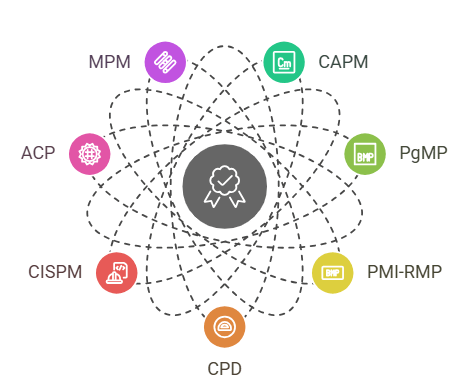
Certified Associate in Project Management (CAPM):
Ideal For: Newcomers to project management and project team members.
Focus Area: Fundamental project management concepts and terminology.
Recognition: Entry-level certification offered by PMI, ideal for those starting their project management journey.
Program Management Professional (PgMP):
Ideal For: Senior-level practitioners who manage complex projects across functions, organizations, or regions.
Focus Area: Coordinating multiple related projects to achieve strategic organizational objectives.
Recognition: Advanced certification offered by PMI, suitable for experienced professionals managing large-scale programs.
PMI Risk Management Professional (PMI-RMP):
Ideal For: Project managers focused on risk management.
Focus Area: Assessing project risks and planning to mitigate threats and capitalize on opportunities.
Recognition: Specialized certification offered by PMI, highlighting expertise in risk management.
Certified Project Director (CPD):
Ideal For: Senior project managers, program managers, and project directors.
Focus Area: Managing, budgeting, and determining the scope of multiple projects.
Recognition: Advanced certification offered by the Global Association for Quality Management (GAQM), suitable for experienced professionals overseeing multiple projects.
Certified Information Systems Project Manager (CISPM):
Ideal For: IT project managers looking to demonstrate their expertise in managing information systems projects.
Focus Area: Managing IT project risks, controls, and audit assurance.
Recognition: Specialized certification offered by the Information Systems Audit and Control Association (ISACA), highlighting expertise in IT project management.
Agile Certified Practitioner (ACP):
Ideal For: Project managers who use Agile practices in their projects or whose organizations are adopting Agile frameworks.
Focus Area: Various Agile methodologies and practices.
Recognition: Certification offered by PMI, suitable for professionals working in Agile environments.
Master Project Manager (MPM):
Ideal For: Experienced project managers looking to highlight their leadership skills and advanced project management knowledge.
Focus Area: Project management skills, emphasizing legal, ethical, and psychological competencies.
Recognition: Professional credential offered by the American Academy of Project Management, suitable for experienced professionals seeking to demonstrate advanced skills.
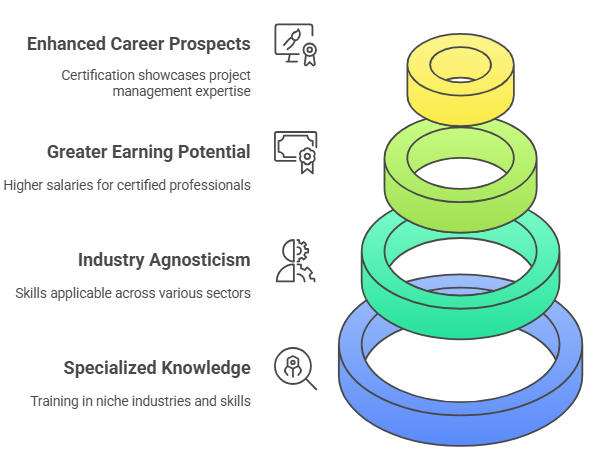
Why Pursue a Top Project Management Certification?
Acquiring a top project management certification provides tangible benefits that can transform your career.
Let's explore these benefits in detail:
Enhanced Career Prospects:
Possessing a recognized certification showcases your expertise in managing diverse project types. Companies worldwide prioritize candidates who hold certifications, as they demonstrate a proven ability to deliver successful outcomes.
Greater Earning Potential:
Professionals with certifications consistently earn higher salaries compared to those without. For instance, certified project managers often earn 15–20% more annually, as their credentials are equated with leadership and advanced problem-solving skills.
Industry Agnosticism:
Top certifications like the PMP are versatile and applicable across industries and regions. Whether you're working in software development, banking, or health services, the skills acquired through these certifications are universally valuable.
Specialized Knowledge:
For targeted expertise, certifications such as the APMIC Certification offer robust training in niche industries. With its focus on areas like healthcare innovation, cloud technology, and Agile adoption, APMIC stands out as a leader in meeting specific professional demands.
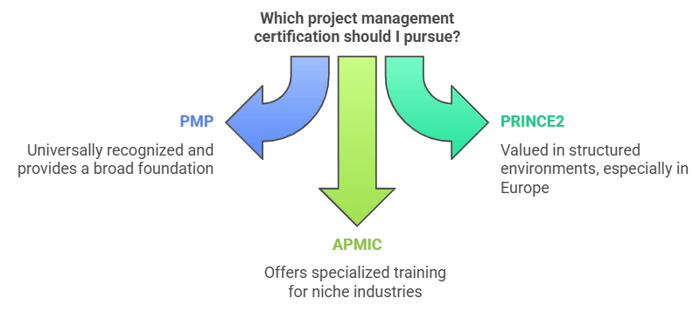
Comparing Top Project Management Certifications
When choosing a certification, it's essential to consider your career goals and the type of projects you manage. Here’s a comparison of the top certifications:
PMP vs. PRINCE2: While PMP is more universally recognized, PRINCE2 is highly valued in structured environments, particularly in Europe.
PMP vs. APMIC: PMP provides a broad foundation, whereas APMIC offers specialized training for niche industries.
How to Choose the Right Certification
Deciding on the right certification involves aligning your choice with your career aspirations. Here are some key questions to ask yourself:
What industries do you want to work in?
Are you looking for a broad skill set or specialized training?
For those aiming to build a strong foundation in project management, certifications such as PMP rank among the top choices. The PMP provides an in-depth understanding of project management frameworks and methodologies that are versatile and widely recognized. This makes it an excellent choice if you're looking for a certification that applies across industries, providing the flexibility to adapt your skills to various career paths.
On the other hand, if your goal is to specialize in a specific sector, like streamlining Agile methodologies in IT projects or managing compliance in healthcare initiatives, a certification such as APMIC might better suit your needs. APMIC stands out among the top project management certifications thanks to its robust curriculum, featuring over 400 modules tailored to niche industries. This kind of deep, industry-specific training equips you to solve specialized challenges and gives you a competitive advantage within focused fields.
For professionals operating in dynamic industries like tech or highly regulated sectors such as healthcare, combining certifications can provide the best career advantage. Earning PMP as a foundational certification and pairing it with APMIC ensures your proficiency in core project management skills while simultaneously granting you expertise in industry-specific strategies. This combination broadens your knowledge base, enhances your marketability, and makes you better prepared for managing complex projects.
Less Commonly Known Facts About Project Management Certifications
Here are some lesser-known facts about project management certifications:
PMP Certification Holders: Over 1.5 million professionals worldwide hold the PMP certification, making it one of the most widely recognized credentials. (Source Link)
PRINCE2 Adoption: PRINCE2 is widely adopted in the UK and other countries, highlighting its popularity in structured project management environments. (Source Link)
APMIC Flexibility: The APMIC Certification allows you to complete its modules at your own pace, making it ideal for working professionals.(Source Link)
Certification ROI: Studies show that certified project managers can earn up to 20% more than their non-certified counterparts.
Certification Duration: Most certifications, like PMP, take 4–6 months to complete, while APMIC can be completed at your own pace.
Online Availability: Most project management certifications are available online, offering flexibility for working professionals.
Specialized Certifications: Certifications like the Certified Project Director (CPD) are designed for senior project managers managing multiple projects.
Conclusion
Pursuing a top project management certification is a significant step toward becoming a leader in the field. Whether you choose the PMP for its broad applicability or the APMIC for its specialized training, these certifications will elevate your career and open doors to new opportunities. For those looking to prepare for the PMP certification, consider enrolling in a comprehensive prep course. Check out our PMP Certification Prep Course at APMIC to get started on your path to success.
FAQs
What is the most recognized project management certification?
The PMP certification is widely regarded as the most recognized and respected in the industry
How long does it take to get a PMP certification?
Typically, it takes 4–6 months to prepare and complete the PMP certification
Is PRINCE2 better than PMP?
It depends on your career goals. PMP is more universally recognized, while PRINCE2 is highly valued in structured environments
What are the benefits of having a project management certification?
Benefits include higher earning potential, enhanced career prospects, and industry recognition
Can I get certified online?
Yes, most project management certifications are available online, offering flexibility for working professionals
Why should I choose APMIC over PMP?
If you need specialized training in a specific industry, APMIC might be more suitable. However, PMP provides a broad foundation applicable across industries.

